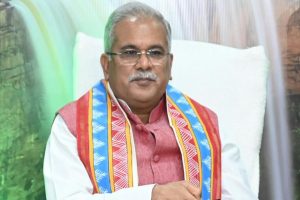As massive landslides wreaked havoc in Wayanad district of Kerala leaving hundreds dead and property destroyed, experts claim the tragedy was avoidable.
Famous environmental scientist Madhav Gadgil ,who was the chairman of the Western Ghats Ecology Expert Panel (WGEEP), has termed the disaster in Wayanad a man-made tragedy, attributing it to the Kerala government’s failure to implement crucial ecological recommendations.
Advertisement
Speaking to a Malayalam news channel on the other day on the backdrops of the landslides in Wayanad, Madhav Gadgil said it is man-made disaster and the government cannot get out of its responsibility
“ The government cannot shirk its responsibility.The government itself is abetting the exploitation of the environment,” Gadgil said.
The noted environmental scientist said that the possibility of landslides in Meppadi region in Wayanad, where the devastating landslides killed hundreds of people last week, had already been pointed out. But the government didn’t care it, he said
The facts pointed out by Madhav Gadgil in his study report in 2011 are being discussed on social media after the massive landslides in Kerala.The noted environmental scientist has in 2013 stated that if Western Ghats have not been protected, huge disasters await Kerala
” If action is not taken yet, a huge disaster awaits Kerala. It doesn’t take ages as you might think, just four or five years. Then you and I will be alive. You yourself will understand who is lying and who is intimidating,”- these are the words shared by Madhav Gadgil in 2013.
Meppadi and Churalmala areas in Wayanad are in the list of environmentally sensitive areas mentioned by Madhav Gadgil in his study report in 2011. The committee, headed by Madhav Gadgil, in its report had recommended the classification of eco-sensitive areas and zones across the Western Ghats. But till date this has not been implemented.
The Western Ghats Ecology Expert Panel led by Madhav Gadgil had specifically warned against anti-environmental activities in Meppadi, where the massive landslide wreaked havoc leaving more than 300 people dead and destructing the entire area.
Meppadi, which is in Vythiri taluk was one of the 18 Ecologically Sensitive Localities (ESL) in Kerala identified by the panel.The panel has submitted its report to the Union government in 2011.
This report that had cautioned against indiscriminate construction and quarrying in Ecologically Sensitive Areas (ESA). In fact, Meppadi in Vythiri taluk — within 2-3 km of which lie Mundakkai and Chooralmala, where landslide occurred on July 30 — was one of the 18 ecologically sensitive zones in Kerala identified by the panel. Brahmagiri – Tirunelli, Wayanad, Banasura Sagar – Kuttiyadi and Nilambur – Meppadi are among the 18.
In its report, the Gadgil panel had proposed to categorise ecologically sensitive areas across the Western Ghats, delineating clear restrictions and regulations on construction activities in ESZ-I and ESZ-II regions. The Gadgil panel had recommended restrictions on mining and quarrying activities along the eco-sensitive areas.
Going by the Gadgil report, Vythiri, Mananthavadi and Sultan Bathery come under ESZ-I, while Perinthalmanna and Tirur taluks in Malappuram will come under ESZ-II.
Madhav Gadgil, who had earlier visited Puthumala region of Meppadi following the 2019 landslide that claimed 17 lives, had specifically pointed out that construction of roads and buildings on the hilly terrain were contributing factors for the landslides.
What happened in Wayanad on Tuesday was a disaster that we consciously brought upon ourselves, said noted environmentalist V S Vijayan who was part of the Gadgil panel. It had proposed that quarrying and red category industries should not be allowed in ESZ- I.
Moreover, in regions where quarrying was permitted, it should be carried out, at least 100 metres away from human settlements. However, the government reduced the distance to a mere 50 metres, pointed out Vijayan.
“We had given clear warnings. The panel identified 18 places as ESAs. Construction activities should have been avoided in these areas. However, due to some reasons, the governments rejected our recommendations,” says Vijayan. In its report submitted before the Union government in August 2011, the panel had warned against activities that will lead to environmental degradation.
However, both the state and Centre were not keen on implementing the same and went ahead with measures aimed at diluting the proposals.
Following opposition from state governments, the Centre government rejected Gadgil panel recommendations and appointed another committee — High Level Working Group — led by Kasturirangan to come up with a fresh report. The Gadgil panel had recommended that about 75 % of Western Ghats be notified as ESAs. The Kasturirangan committee, however, reduced the extent of ESAs.
The then state government led by Oommen Chandy had opposed the Western Ghats Ecology Expert Panel(WGEEP) report and entrusted another panel led by Oommen V Oommen to come up with an independent report. Congress leader P T Thomas was one of the very few politicians who had favoured the Gadgil report
Geoscientist and professor professor at the National Institute of Advanced Studies, Bengaluru, C P Rajendran says human interventions including deforestation, unplanned construction activities and climate vagaries caused the devastating landslides in Wayanad
According to the Kerala Disaster Management Authority’s landslide hazard profile map, over forty per cent of Wayanad district is susceptible to landslides, with the Meppadi region, including Chooralmala, Mundakai, and Puthumala, being especially critical. Kavalappara in the Malappuram district, which experienced a massive landslide four years ago, is on the opposite side of the Meppadi hills.
Experts have suggested that the state government should come up with a policy for people in ecologically fragile areas prone to annual landslides and floods. There is a need to relocate and rehabilitate people from such areas, they say.
The Kerala government had promised to take up both these activities after devastating floods struck the state in 2018. The massive deluge had triggered numerous landslides in Wayanad and Idukki districts.
However, progress is yet to be made although extreme weather events have become an annual affair in Kerala.
In the last six years alone, about 300 people died in landslides that occurred across Kerala. The latest tragedy indicates that massive rains and major landslides will continue to haunt the state in the future as well.
Four years ago, the Puthumala landslide in Kerala led to the emergence of ‘soil piping’. This hydraulic process creates large air-filled voids in the subsurface, often associated with landslides and collapse subsidence.
The landslides in Mundakkai and Chooralmala imply that soil piping may have been the cause. Interestingly, Puthumala is just two kilometres from where the July 30 landslides occurred.
The recent landslides exhibit all the characteristics of soil piping, according to M G Manoj, a scientist from the Advanced Centre for Atmospheric Radar Research. He also pointed out the soil’s inability to absorb large amounts of water in a short period and the significant surface voids formed by the Puthumala tragedy, which contributed to the scale of the disaster.
The massive landslides in Wayanad has raised questions about the rationale behind the proposed four-lane underground twin tunnel project which the Kerala government is reportedly pursuing to improve tourism in the region.
The proposed tunnel is expected to be third-largest in India. The pathway will connect Anakkampoyil in Kozhikode and Meppadi in Wayanad — where the landslide took place — and is expected to bring down the distance between the two districts from 85 km to 54 km. Not just activists and environmentalists, even the government’s own impact assessment report has said that the land in the area is unstable.
“The crown of the landslide is close to the proposed mouth of the tunnel in Vellarimala,” said N Badushah, president of Wayanad Prakrithi Samrakshana Samithi, a collective that has been campaigning against the project citing the ecological fragility of the Western Ghats.
It has been pointed out that the state Disaster Management Authority in 2020 advised the relocation of 4000 families from the landslide -prone areas in Wayanad.Mundakkai was among these areas. However, the advise fell on deaf ears, ecologists said.
















